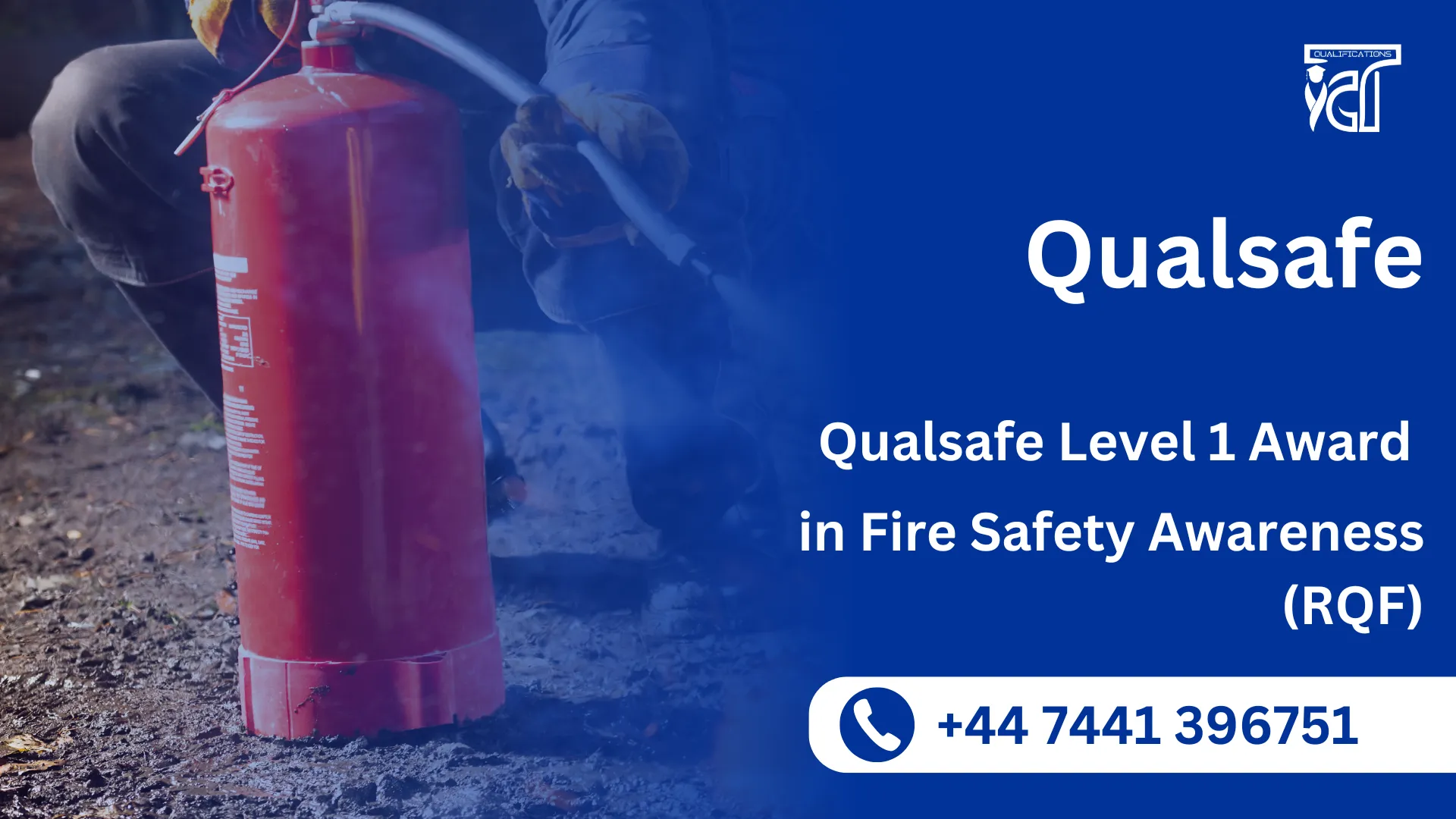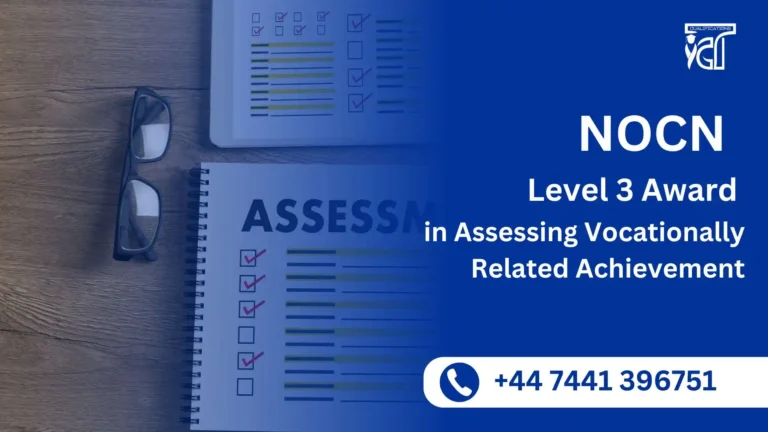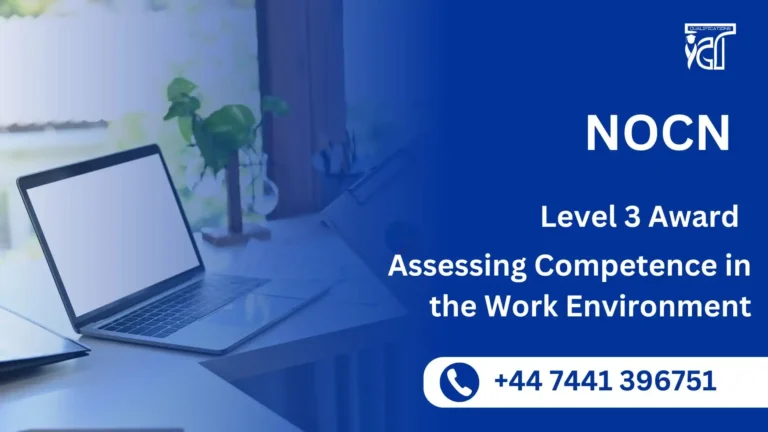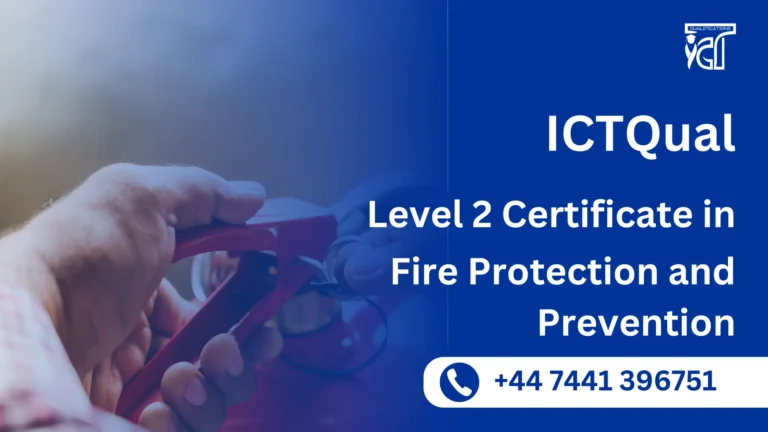Fire safety is a critical element in maintaining a safe working environment, and ensuring that all employees understand fire risks and safety protocols is essential. The Qualsafe Level 1 Award in Fire Safety Awareness (RQF) is an Ofqual-regulated qualification that provides an essential foundation in fire safety knowledge. This qualification is entirely assignment-based, offering flexibility for individuals to complete the course at their own pace.
The Qualsafe Level 1 Award in Fire Safety Awareness (RQF) is a beginner-level qualification designed to equip individuals with the fundamental knowledge of fire safety in the workplace. This course provides the skills needed to understand fire risks, respond to emergencies, and contribute to creating a fire-safe environment.
As an Ofqual-regulated qualification, the course meets national standards and is widely recognized, making it a valuable asset for employees in various sectors. The course is entirely assignment-based, allowing learners to complete the course at their own pace without the pressure of exams. This makes it ideal for busy professionals or organizations looking for flexible training solutions.
The Qualsafe Level 1 Award in Fire Safety Awareness (RQF) is a fundamental qualification that provides essential fire safety knowledge, helping to reduce risks and ensure the safety of individuals in the workplace. Whether you’re a business owner, manager, or employee, this Ofqual-regulated course offers the practical skills needed to enhance fire safety awareness and create a safer work environment.
Qualsafe Level 1 Award in Fire Safety Awareness (RQF)
The Qualsafe Level 1 Award in Fire Safety Awareness (RQF) has 1 unit that Learners are required to complete in order to achieve the qualification. Qualification unit 1 has 3 GLH.
| Sr# | Unit Title |
|---|---|
| 1 | Understand basic fire safety and what to do in the event of an emergency |
| 2 | Understand the principles of fire risk control |
| 3 | Understand the basics of practical fire safety |
GLH (Guided Learning Hours) and TQT (Total Qualification Time) are terms commonly used in vocational qualifications to help define the amount of time a learner is expected to spend on their studies.
1. GLH (Guided Learning Hours)
GLH refers to the number of hours a learner spends being directly taught, supervised, or supported during their course. This includes the time spent in activities such as:
- Classroom instruction
- Practical workshops
- One-on-one tutoring or mentoring sessions
- Online learning sessions with tutor support
In other words, GLH represents the time that learners are actively engaged with their instructors or learning activities.
2. TQT (Total Qualification Time)
TQT represents the total amount of time a learner is expected to invest in completing a qualification, including:
- GLH (Guided Learning Hours): Time spent on direct learning, as explained above.
- Self-Directed Learning: This includes time spent on independent study, research, assignment completion, preparation for exams, and any other work the learner does outside of direct teaching hours.
TQT is a broader measure that includes all the time required to achieve the qualification. It helps learners and employers understand the overall commitment required for the qualification.
Key Differences Between GLH and TQT:
- GLH focuses on direct learning with guidance or supervision.
- TQT includes GLH as well as independent study time and other learning-related activities.
Example:
If a qualification has a TQT of 600 hours and a GLH of 250 hours, it means the learner should spend 250 hours in direct learning (classroom, online, or tutor-led sessions) and 350 hours on independent study or research.
Learning Outcomes for the Qualsafe Level 1 Award in Fire Safety Awareness (RQF)
Upon completing the Qualsafe Level 1 Award in Fire Safety Awareness (RQF), learners will be able to:
- Understand Basic Fire Safety and Emergency Procedures
- Recognize basic fire safety principles and the importance of fire safety awareness.
- Understand the immediate actions to take in the event of a fire emergency.
- Identify fire evacuation procedures and the role of emergency exits.
- Understand the Principles of Fire Risk Control
- Comprehend the fundamental concepts of fire risk control, including the identification of common fire hazards.
- Recognize methods to reduce or eliminate fire risks in the workplace through prevention measures and safety practices.
- Understand the importance of maintaining fire safety equipment and ensuring its availability.
- Understand the Basics of Practical Fire Safety
- Gain basic knowledge of fire safety equipment, such as fire extinguishers, alarms, and fire exits.
- Learn the practical application of fire safety measures, including how to use fire extinguishers safely in the event of a fire.
- Understand the importance of fire drills and safety procedures to ensure effective emergency responses.
Benefits of the Qualsafe Level 1 Award in Fire Safety Awareness (RQF)
The Qualsafe Level 1 Award in Fire Safety Awareness (RQF) offers a range of benefits for individuals and organizations looking to enhance their fire safety knowledge and practices. Below are the key advantages of this essential qualification:
1. Ofqual-Regulated Qualification
As an Ofqual-regulated qualification, the Qualsafe Level 1 Award in Fire Safety Awareness (RQF) is recognized nationally, ensuring that the qualification meets industry standards and regulatory requirements. It provides credibility and value in the workplace, demonstrating your commitment to safety.
2. Flexible, Assignment-Based Learning
The course is entirely assignment-based, allowing learners to complete it at their own pace, without the pressure of exams. This flexible format makes it ideal for individuals with busy schedules or those balancing work and study commitments.
3. Improved Workplace Safety
By completing this course, employees gain essential fire safety knowledge, which helps identify fire hazards, implement prevention measures, and respond effectively in emergencies. This leads to a safer work environment for everyone, reducing the risk of fire-related incidents.
4. Easy to Understand and Accessible
Designed for beginners, this course provides clear, easy-to-understand information on fire safety principles. It is accessible to individuals from all backgrounds and industries, making it suitable for a wide range of employees, from new hires to experienced staff.
5. Essential Fire Safety Awareness for All Employees
Every workplace, regardless of industry, requires basic fire safety awareness. This course ensures that all employees understand their roles and responsibilities in the event of a fire. It covers crucial topics like evacuation procedures, fire risks, and fire prevention techniques, making it relevant for everyone in the organization.
6. Cost-Effective and Time-Efficient
The Qualsafe Level 1 Award in Fire Safety Awareness (RQF) is a cost-effective training solution for organizations looking to provide fire safety awareness to their employees. As it is assignment-based, the course can be completed without the need for time-intensive classroom sessions, saving both time and money.
7. Compliance with Fire Safety Regulations
Organizations are legally required to provide fire safety training. By completing this course, businesses ensure that they are compliant with fire safety regulations, reducing the risk of fines or penalties. It helps meet legal requirements and ensures that staff are prepared for emergencies.
8. Builds Employee Confidence
Employees who have completed this course will feel more confident in handling fire emergencies. They will know what actions to take, such as evacuating safely, using fire extinguishers, and following emergency procedures, which enhances their ability to manage situations effectively.
9. Global Recognition
As an Ofqual-regulated qualification, the Qualsafe Level 1 Award in Fire Safety Awareness (RQF) is recognized internationally. This makes the qualification valuable not only for UK-based organizations but also for individuals looking to apply their skills in global workplaces.
10. Foundation for Further Fire Safety Training
The Level 1 Award provides a foundational understanding of fire safety. For those wishing to advance their knowledge, this course serves as the first step toward more advanced fire safety qualifications, such as the Level 2 Award in Fire Safety or roles like fire warden or fire safety manager.
Best Fit for the Qualsafe Level 1 Award in Fire Safety Awareness (RQF)
The Qualsafe Level 1 Award in Fire Safety Awareness (RQF) is ideal for individuals and organizations seeking to enhance fire safety awareness in the workplace. Below are the key groups of people who will benefit most from this course:
1. All Employees
This course is suitable for all employees in any organization, regardless of their role. Every workplace needs basic fire safety awareness, and this course ensures employees understand how to identify fire risks, use fire safety equipment, and follow emergency procedures effectively.
2. New Hires and Onboarding Employees
For new hires, this course is an excellent way to ensure that all employees receive essential fire safety training as part of their induction. It provides a foundation of knowledge that they can build on as they grow within the company.
3. Small Business Owners
Small business owners who have limited resources for training can benefit from this cost-effective and accessible course. It equips their staff with basic fire safety knowledge and ensures they meet legal fire safety training requirements.
4. Health and Safety Managers
For health and safety managers, this course provides a foundational understanding of fire safety principles that they can apply to further improve safety standards across the workplace. It ensures that all team members are aware of fire safety procedures and understand the importance of prevention.
5. Those Working in High-Risk Environments
Employees working in industries with higher fire risks, such as hospitality, construction, and manufacturing, will benefit from this course. It helps them understand the specific fire risks present in their environments and the preventive measures they should take to ensure safety.
6. Individuals Pursuing Fire Safety Careers
Individuals who are starting their careers in fire safety or health and safety management can use this course as a stepping stone. It provides foundational knowledge that prepares them for more advanced qualifications and roles in fire safety manage.
Entry Requirements
Register Now
Qualification Process
Qualification Process for the Qualsafe Level 1 Award in Fire Safety Awareness (RQF)
- Self-Assessment:
Begin by evaluating your eligibility to ensure you meet the qualification requirements, including work experience, knowledge, and language proficiency. - Registration:
Complete your registration by submitting the required documents, including a scanned copy of a valid ID, and paying the registration fee. - Induction:
An assessor will conduct an induction to confirm your eligibility for the course and explain the evidence requirements. If you do not meet the criteria, your registration will be canceled, and the fee will be refunded. - Assignmnets & Evidence Submission:
Provide all assignmnets and the necessary evidence based on the assessment criteria outlined in the course. If you are unsure of the required evidence, consult with the assessor for guidance on the type and nature of evidence needed. - Feedback and Revision:
The assessor will review your submitted evidence and provide feedback. Evidence that meets the criteria will be marked as “Criteria Met,” while any gaps will be identified. You will be asked to revise and resubmit if needed. - Competence Evidence:
Submit final evidence demonstrating that all learning outcomes have been met. This evidence will be marked as “Criteria Met” by the assessor once it is satisfactory. - Internal Quality Assurance (IQA):
The Internal Quality Assurance Verifier (IQA) will review your evidence to ensure consistency, quality, and compliance with standards. - External Verification:
The IQA will submit your portfolio to Qualsafe External Quality Assurance Verifiers (EQA) for final confirmation. The EQA may contact you directly to verify the authenticity of your evidence. - Certification:
Upon successful completion of all checks, Qualsafe will issue your official certificate, confirming that you have attained the Qualsafe Level 1 Award in Fire Safety Awareness (RQF).







